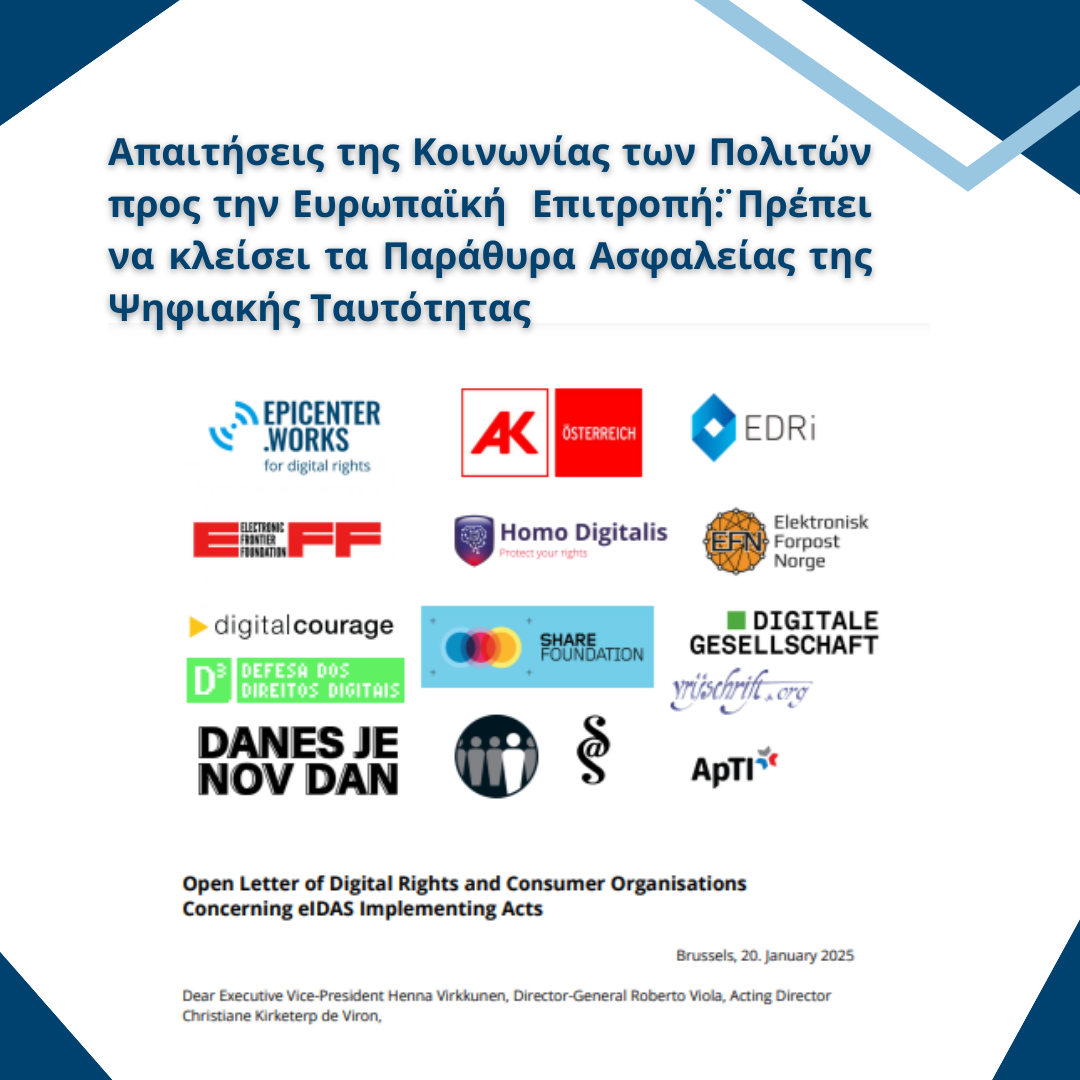From Secrecy to Transparency: The Five-Year Battle for the Publication of Police Camera Operation Decisions
Strategic legal action takes time, but its outcomes benefit society as a whole, strengthening public trust in institutions.
In December 2020, Homo Digitalis, in collaboration with Reporters United and The Press Project, formally requested access to the Hellenic Police’s decisions regarding the operation of drones and other portable cameras in public spaces, as stipulated in Article 12 of Presidential Decree 75/2020. Despite the legal obligation to publish these decisions publicly, the police refused access, disregarding the transparency required by law.
A few months later, in May 2021, we filed a joint complaint before the Hellenic Data Protection Authority (HDPA), citing repeated non-compliance by the police—at least 67 times over a short period. The HDPA launched an investigation into the legality of these practices.
In early 2024, we submitted a request for access to HDPA documents to better understand the progress of the investigation. Correspondence between the Hellenic Police and the HDPA revealed that, even as of March 2024, the police continued to argue that Presidential Decree 75/2020 did not require them to publish camera operation decisions, despite the HDPA’s opposing view.
Yesterday, through a report by journalist Giannis Bazaios in Efimerida ton Syntakton, we learned that such a decision had been published on the Hellenic Police’s website. Indeed, upon verification, we found that as of February 17, 2025, the police had changed their practice and begun publishing these decisions as required by law. The report was published today online here.
From the initial refusal in 2020, it took five years for this change to be implemented. We now eagerly await the final decision of the HDPA and the conclusion of its investigation, which will establish a definitive framework for transparency and accountability within law enforcement.
We co-sign an CSO Open Letter on the proposed GDPR Procedural Regulation
As the trilateral negotiations at the EU level continue regarding the proposed regulation on additional procedural rules for the enforcement of the GDPR, we, together with European Digital Rights and 34 other Civil Society organizations, join our voices in an open letter to lawmakers!
We urge them to prioritize strong enforcement mechanisms that ensure individuals can effectively exercise their rights while highlighting the systemic weaknesses in the enforcement of GDPR provisions.
Read the open letter here.
We sign a common CSO statement for the AI Summit on the protection of environment
Ahead of the AI Action Summit in France, 100+ civil society organisations from around the world have an urgent message for governments and industry leaders: The environmental and human costs of AI are too high – we need action now.
Our 5 key demands:
-Phase out fossil fuels
-Bring computing within limits
-Ensure responsible supply chains
-Enable equitable participation
-Advance meaningful transparency It’s time for AI to be sustainable, just, and accountable.
You can read our full demands here.
You can co-sign our common statement here.
Statements from Homo Digitalis in an article by Reporters United, Investigate Europe & EfSyn on the AI Act
Following the investigation and related revelations carried out last week by Reporters United, Investigate Europe, and EfSyn regarding the trilateral meetings on the AI Act and the negative stance of the Greek government on the security safeguards for biometric identification at a later stage, today in a new report, journalist Εurydice Bersi highlights how various state bodies have been systematically violating for years the security safeguards that European data protection legislation provides for the artificial intelligence systems already in use in our country.
We sincerely thank the journalist for her interest in our related actions and for the opportunity to provide some brief comments on the challenges we have identified and the lack of compliance that has been evident over time. Our statements were represented by Eleftherios Chelioudakis.
In fact, as part of the journalists’ investigation, a request for access to information has already been submitted, calling on the Greek government to disclose the documents with its positions on the trilateral meetings!
You can read the related article and their detailed investigation here.
Open Letter to the President of the European Commission to Stand Up Against Big Tech Companies
Over 40 civil society organizations, across the EU and the US, have an urgent message for the European Commission and President Ursula von der Leyen. Now is the time to stand up to the bullying by Big Tech companies and their allies in the Trump administration.
Europe must commit to strong enforcement of the DSA, DMA regulations, and other digital laws to protect people, our democracy, and our economy!
Read our open letter here.
Civil Society Demands: EU Commission Must Close e-ID Loopholes!
The final technical design of the European Digital Identity Wallet is currently under negotiation. These blueprints will have a big impact on whether or not users will be sufficiently protected when using Europe’s upcoming digital identity system. In concrete terms, this is currently being negotiated in the eIDAS implementation acts between the EU member states and the European Commission.
The positive changes in the first batch of technical rules show: Civil society works! Together with 15 organisations we thank the negotiators and acknowledge these significant improvements for privacy and human rights safeguards. The most recent proposals, however, still have some severe privacy and transparency problems that we address in our open letter to the European Commission.
What is the problem?
The eIDAS regulation lays out concrete rules for those companies and government agencies who want to access personal information from citizens’ Wallets. This could be for example an online platform, a public transport company or your doctor. It obliges these so-called “relying parties” to register their intended use of the Wallet, that is which attributes they intend to request from users. The regulation also prohibits them from asking information that goes beyond their registration. This could mean for example that, according to its registration, an online shop is only allowed to ask for your name and address but not your birth date or other information. A porn platform might use the Wallet to verify your age, but couldn’t obtain not any other information about you or use other means to track your behaviour.
To protect everyone from such illegal requests, the EU’s Digital Identity Wallet needs to know what personal information a relying party is actually allowed to access. The EU Commission, however, proposes a loophole which would leave it to the Member State that registered the relying party to decide whether the Wallet knows about the contents of the registration or not. This would allow Facebook Ireland to circumvent the protections and ask European users for everything. Furthermore, the public register of relying parties risks being useless without harmonised specifications on how to access it and what results to expect. Ultimately, the trust we will put in the Wallet will depend on the protections and transparency that we can rely on.
15 Organisations demand: The Commission’s Loopholes Must be Closed!
If these loopholes remain, this would have disastrous consequences. Any discrimination based on illegal access to attributes in the Wallet (health, gender, income, etc.) would be unchecked. Given the track record of lax data protection enforcement in countries like Ireland, companies like Facebook Ireland would likely have a wildcard certificate, virtually empowering them to request any data they want. Member States dedicated to protecting their users from illegal requests (e.g. Germany, the Netherlands, Spain or Austria), on the other hand, would be incapable of doing so.
We therefore ask the Commission to make relying party registration certificates mandatory for all relying parties and to issue a harmonized specification to access the relying party registry of each Member State.
Statements from our President, Elpida Vamvaka, at the 13th e-Business & Digital Marketing World 2024
The President of Homo Digitalis, Elpida Vamvaka, represented us with a speech at the 13th e-Business & Digital Marketing World 2024, with the central theme: “From WOW to HOW: e-commerce and digital marketing in the AI era!”, which was organized by SmartPress S.A. in December 2024.
Both her speech during the panel she participated in and the statements she gave to the organizers after the conference are now available.
You can view her statements here. You can view her speech and the panel she participated in (04:11:00) here.
The Award-Winning Cartoon Series Super-Cyber Kids Now Has Subtitles
The award-winning cartoon series Super-Cyber Kids, a production by ISC2 Hellenic Chapter, ICSI HELLAS S.A., and Homo Digitalis, with the support of ADACOM Cyber Security, Eurolife FFH, bora, and RESET CONSULTANTS, is now available with Greek subtitles! A big thank you to the amazing Panagiotis Soulos for this significant volunteer initiative!
- How can excessive use of social media negatively impact children’s performance in school or sports?
- Are there risks of personal data leaks and password theft when connecting to third-party WiFi networks?
- How do incidents of cyberbullying occur?
- What connection might cybersecurity have with the evolution of a war like the Trojan War?
- How can a teenage team win a soccer match by spying on their opponents’ social media?
Answers to all these questions and much more are provided in the five episodes of the series, available for free on our YouTube channels here.
Homo Digitalis Collaborates Once Again with the Digital World Summit Greece
We are delighted to announce that, for yet another year, the Digital World Summit Greece (DWS Greece) and Homo Digitalis are moving forward with a strategic partnership!
The Digital World Summit Greece (DWS Greece) aims to promote the democratic governance of new technologies. As a dialogue platform, it brings together diverse stakeholders and groups, shaping policies from the grassroots level to the top on issues related to artificial intelligence, platforms, the Internet of Things, and broader technological domains.
Homo Digitalis has actively supported DWS Greece since its inception, and it is a great honor for us to continue doing so dynamically. Together, we aim to contribute to the maturation of public discourse in Greece on issues related to digital rights.
You can learn more about the activities of the Digital World Summit Greece on their website, here.








